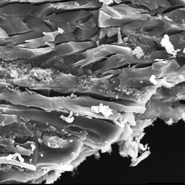Posted 05 November 2009
Ancient muscle tissue extracted from 18 million year old fossil
Scientists have extracted organically preserved muscle tissue from an 18 million years old salamander fossil. The discovery by researchers from University College Dublin, the UK and Spain, reported in the Proceedings of the Royal Society B shows that soft tissue can be preserved under a broader set of fossil conditions than previously known.
The scientists claim that their discovery is unequivocal evidence that high-fidelity organic preservation of extremely decay prone soft tissues is more common in the fossil record – the only physical record of the history of life on earth.
Previous examples of soft tissues fossilised in this way have been limited to samples extracted from amber or inside bone – a very rare set of circumstances. This latest discovery simply occurs inside the body of the salamander tucked in beside the spine.
“We came across the muscle tissue during our analysis of several hundred fossil samples taken from an ancient lake bed in Southern Spain. It was immediately identifiable by the sinewy texture visible under the microscope,” says Dr Patrick Orr from the UCD School of Geological Sciences, University College Dublin.
“After first sighting the material, we completed a series of highly detailed analyses to limit the possibility that it was simply an artefact of preservation or something unrelated to the biology of the animal.” says UCD geologist, Dr Maria McNamara, the lead author of the report.
”We noticed that there had been very little degradation since it was originally fossilised about 18 million years ago, making it the highest quality soft tissue preservation ever documented in the fossil record.”
According to the University College Dublin geologists, the muscle tissue is organically preserved in three dimensions, with circulatory vessels infilled with blood.
Using the same sampling methods and high resolution imaging that led to this find, scientists will now begin to investigate existing fossils in national museums and elsewhere across the world, for similar types of soft tissue preservation.
Although examples of soft tissue preservation are likely to remain incredibly rare, further discoveries will help scientists paint a better picture of life on earth since the beginning of evolutionary time.
Proceedings of the Royal Society
The Royal Society, the national academy of science of the UK and the Commonwealth, has existed since 1660. It acts as an independent scientific academy, learned society and funding body. Its remit is to publish leading research in various disciplines, support many top young scientists, engineers and technologists, influence science policy, debate scientific issues with the public.
The Royal Society publishes seven journals covering the broad spectrum of the life sciences, physical sciences and cross-disciplinary sciences. The Proceedings of the Royal Society B is the Royal Society's flagship international biological research journal, dedicated to the rapid publication and broad dissemination of high-quality research papers. Its scope is diverse and incorporates all areas of the biological sciences. All papers are stringently peer-reviewed, and publication criteria include scientific excellence, originality and interest across biological disciplines.
UCD School of Geological Sciences, University College Dublin, Ireland
The UCD School of Geological Sciences is the largest Geoscience School in Ireland. The skills and expertise of academic staff, support staff, researchers and PhD students are the basis of its internationally recognised reputation in research across a broad spectrum of disciplines within the Earth Sciences.
It delivers an undergraduate degree programme, BSc (Hons) Geology, and contributes to inter-disciplinary BSc programmes in Climate and Earth System Science and Archaeology and Geology. A cornerstone of these programmes is a sound academic training, and the development of independent observational and interpretational skills.

